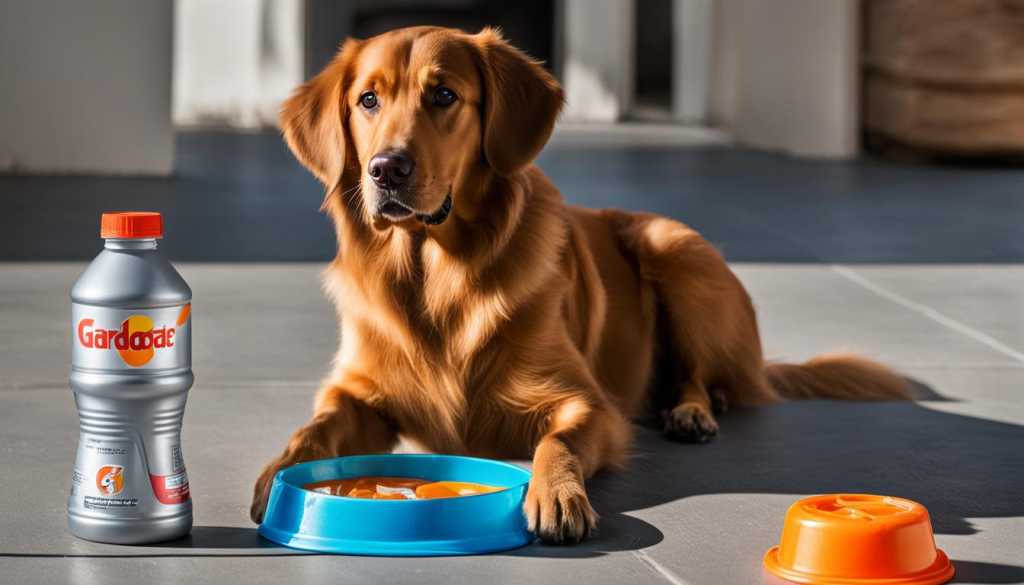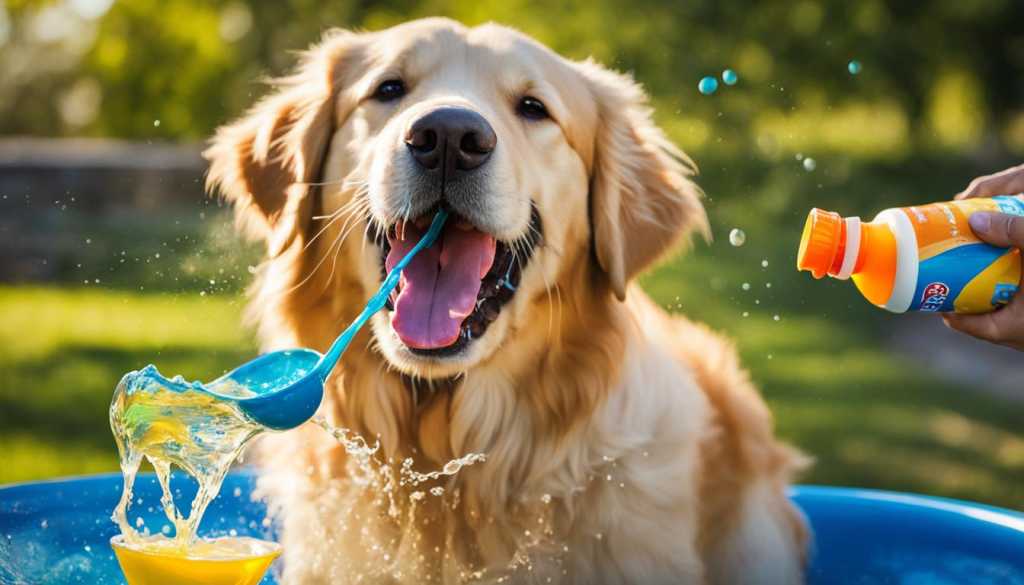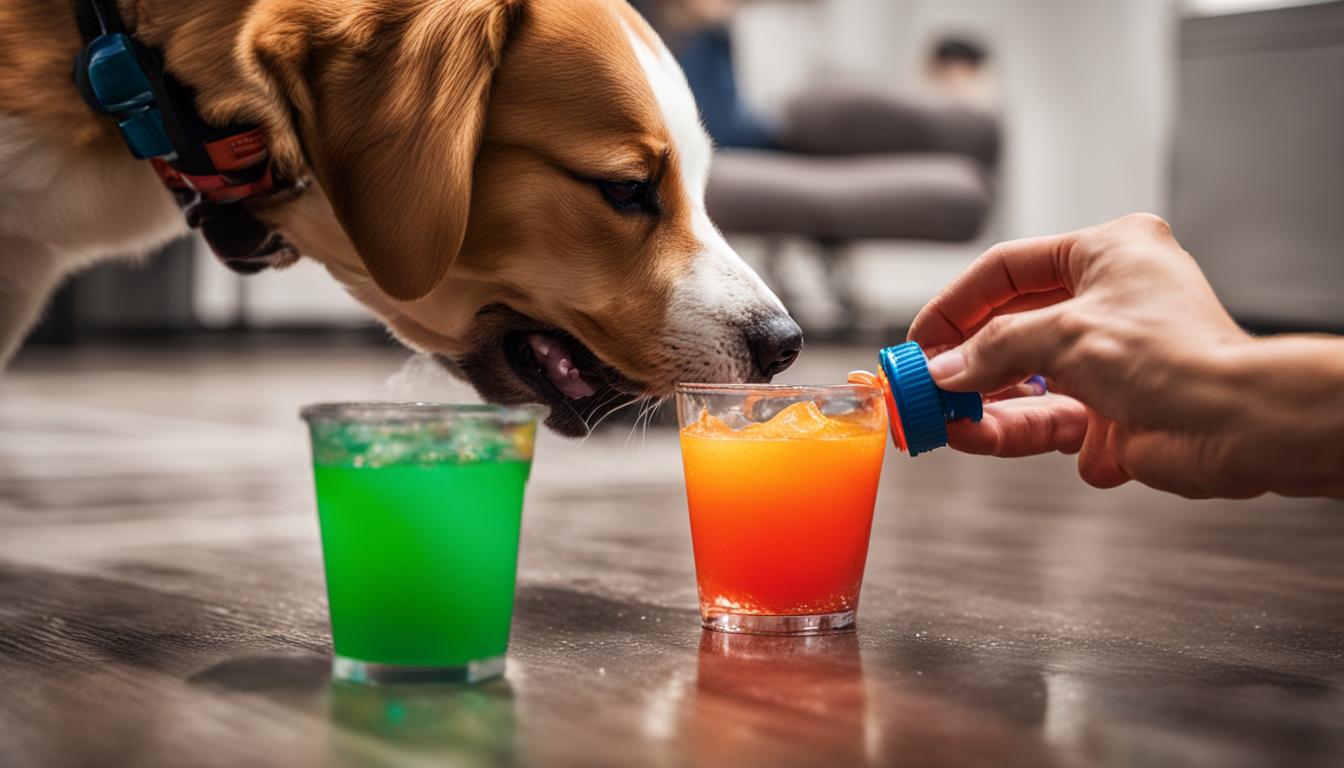Gatorade, the popular sports drink humans rely on for electrolyte replenishment and hydration, often sparks curiosity among dog owners. Is it safe to give Gatorade to dogs? While theoretically safe, there are important considerations to bear in mind before offering this beverage to your furry friend. Understanding when and how to give Gatorade to dogs is crucial, as well as exploring alternative hydrating options.
Key Takeaways:
- Gatorade is not formulated specifically for dogs and contains high levels of sugar and sodium, which can be harmful to their health.
- Gatorade should only be given to dogs under the guidance of a veterinarian, especially in cases of severe dehydration due to illness.
- To safely give Gatorade to dogs, dilute it with water by preparing a mixture of 50% water and 50% Gatorade.
- Portion control is crucial, and Gatorade should only be given in extreme situations and for a limited duration.
- While Gatorade can have some benefits for dogs experiencing severe dehydration, it should always be administered with veterinary guidance.
Is Gatorade Safe for Dogs?
Gatorade is a popular sports drink that humans use to replenish electrolytes and hydrate their bodies. But what about dogs? Can dogs drink Gatorade? While Gatorade is theoretically safe for dogs, there are some important considerations to keep in mind.
Gatorade is safe for dogs in the sense that it won’t poison them if they consume it. However, it’s important to note that Gatorade is not formulated specifically for dogs and contains high levels of sugar and sodium, which can be harmful to their health.
While Gatorade can be considered in certain situations, such as severe dehydration due to illness, it should only be given to dogs under the guidance of a veterinarian. They will be able to assess the situation and determine if Gatorade is the best option or if there are safer alternatives available.
“Gatorade is not an ideal beverage for dogs, it can have a few health benefits in certain cases, especially for dogs experiencing severe dehydration or electrolyte imbalances due to illness or excessive physical activity,” says Dr. Smith, a veterinarian.
The bottom line is that while Gatorade is not inherently toxic to dogs, it should not be a regular part of their diet. It’s important to prioritize their health and well-being by offering them safe and suitable hydration options. Water is the best and most natural choice for dogs, and alternatives like electrolyte water or unsweetened coconut water can be considered in consultation with a vet.
When to Give Gatorade to Dogs?
Gatorade should only be given to dogs in specific situations, particularly when they are severely dehydrated. It is important to note that Gatorade is not a substitute for water as the primary source of hydration for dogs. When a dog is experiencing severe dehydration due to conditions such as diarrhea or vomiting, Gatorade can help replenish essential nutrients and electrolytes temporarily. However, this should only be done under the guidance of a veterinarian.
In cases where quick access to a veterinarian is not possible and a dog is in urgent need of hydration, Gatorade can be considered as a stopgap solution. This can help prevent further complications from dehydration until professional care is available. However, it is crucial to consult with a vet before administering Gatorade to ensure the appropriate dosage and duration of use.
Remember, Gatorade should not be given to dogs as a regular beverage or for mild cases of dehydration. Water should always be the first choice for hydrating dogs, and alternative options such as electrolyte water or unsweetened coconut water can be considered under veterinary guidance. Your veterinarian will be able to provide personalized advice based on your dog’s specific needs and health condition.
How to Safely Give Gatorade to Dogs?
When giving Gatorade to dogs, it’s important to prioritize their health and follow specific safety measures. Here are some key guidelines to ensure you can safely administer Gatorade to your furry friend:
Consult with Your Veterinarian:
Before offering Gatorade to your dog, it’s essential to consult with your veterinarian. They can provide expert advice tailored to your dog’s specific needs and health condition. Your vet will guide you on whether Gatorade is suitable and how to safely incorporate it into their hydration routine.
Dilute Gatorade with Water:
To reduce the sugar and sodium content of Gatorade, it’s recommended to dilute it with water. Prepare a mixture consisting of 50% water and 50% Gatorade. This helps to minimize the sweetness and prevents stomach upset in dogs. Remember to use plain water without any added flavors or additives.
Practice Portion Control:
When giving Gatorade to dogs, it’s crucial to practice portion control. Only offer Gatorade in extreme situations and for a limited duration as advised by your vet. Avoid giving Gatorade constantly as it can lead to health complications. Always follow the recommended serving size based on your dog’s weight and overall health condition.

By following these safety measures, you can ensure that your dog receives Gatorade in a controlled and safe manner when necessary. Remember that Gatorade should not be a regular part of their diet and should be used under veterinary guidance for specific dehydration situations.
Benefits of Gatorade for Dogs
Gatorade may not be an ideal beverage for dogs, but in certain cases, it can provide some health benefits, particularly during instances of severe dehydration or electrolyte imbalances. When dogs are experiencing these conditions due to illness or excessive physical activity, Gatorade can help replenish essential nutrients and prevent further complications.
However, it’s crucial to consult with a veterinarian before administering Gatorade to your dog. They can provide proper guidance and ensure that giving Gatorade is the appropriate course of action for your pet’s specific situation. Professional advice is essential as providing Gatorade without proper knowledge can potentially do more harm than good.
It’s important to note that Gatorade should only be considered as a temporary solution and under the guidance of a veterinarian. Water is the best and most natural choice for hydrating dogs on a regular basis. If your dog does require additional hydration support, electrolyte water or unsweetened coconut water can be safer alternatives to consider in consultation with your vet.
| Benefits of Gatorade for Dogs |
|---|
| Gatorade can help replenish electrolytes in dogs experiencing severe dehydration. |
| It can support dogs with electrolyte imbalances due to illness or excessive physical activity. |
| In certain cases, Gatorade can help prevent further complications from dehydration. |
| Consulting with a veterinarian is crucial to determine if Gatorade is suitable for your dog’s specific needs. |
In summary, while Gatorade may have some benefits for dogs in specific situations, it should only be given under veterinary guidance and as a temporary solution. Prioritize your dog’s health and well-being by offering them safe and suitable hydration options, such as water or veterinarian-approved alternatives.
Can Dogs Have Sugar-Free Gatorade?
Sugar-free Gatorade may seem like a healthier option for dogs, but it’s actually not recommended. These types of beverages often contain artificial sweeteners like xylitol, which can be extremely toxic to dogs. Xylitol can cause a rapid release of insulin in their bodies, leading to low blood sugar levels (hypoglycemia).
It’s important to be aware of the dangers of sugar-free Gatorade for dogs and avoid giving it to them. Even small amounts of xylitol can be harmful and potentially life-threatening to our furry friends. It’s always best to prioritize their safety and opt for safer alternatives for hydrating your dog.
Alternatives to Sugar-Free Gatorade for Dogs
- Water: The most natural and safe option for hydrating your dog is plain water. Make sure they have access to clean drinking water at all times.
- Electrolyte Water: If your dog is experiencing severe dehydration, electrolyte water designed for dogs can be a suitable option. Consult with your veterinarian for specific recommendations.
- Unsweetened Coconut Water: Coconut water is a natural source of electrolytes and can be given to dogs in moderation. However, it’s essential to choose unsweetened varieties without any added sugars or artificial additives.
By choosing these alternatives, you can ensure that your dog stays hydrated and healthy without the potential risks associated with sugar-free Gatorade.
Remember, always consult with your veterinarian before making any changes to your dog’s diet or introducing new beverages. They will be able to provide you with tailored advice and guidance based on your dog’s specific health needs and conditions.

Is Gatorade Bad for Dogs?
Gatorade can have negative effects on dogs due to its high sugar and sodium content. Excessive consumption of Gatorade can lead to health complications and should be avoided. Here are some of the potential health issues that can arise from giving Gatorade to dogs:
Digestive Issues:
The high sugar content in Gatorade can cause digestive upset in dogs. It can lead to diarrhea, vomiting, and discomfort. Dogs have different digestive systems than humans, and their bodies may not be able to properly process the ingredients in Gatorade.
Kidney Stress:
The high sodium content in Gatorade can put stress on a dog’s kidneys. Dogs have different hydration needs than humans, and an excessive amount of sodium can disrupt their electrolyte balance and potentially lead to kidney problems.
Dehydration Risk:
Ironically, consuming too much Gatorade can actually contribute to dehydration in dogs. The high sugar content can draw water from the dog’s body into the digestive system, leading to further dehydration.
Given these potential health complications, it’s best to avoid giving Gatorade to dogs. It’s important to prioritize their well-being and provide them with suitable alternatives for hydration.
Table: Health Complications of Gatorade in Dogs
| Health Complications | Description |
|---|---|
| Digestive Issues | Gatorade can cause diarrhea, vomiting, and discomfort in dogs due to its high sugar content. |
| Kidney Stress | The high sodium content in Gatorade can put stress on a dog’s kidneys, potentially leading to kidney problems. |
| Dehydration Risk | Consuming excessive amounts of Gatorade can draw water from a dog’s body, contributing to dehydration. |
It’s important to provide dogs with the proper hydration they need through sources such as fresh water. If a dog is experiencing severe dehydration or electrolyte imbalances, it’s best to consult with a veterinarian for appropriate guidance and treatment.
What if My Dog Drank a Lot of Gatorade?
If your dog accidentally consumes a large amount of Gatorade, it’s important to take immediate action. Contact your veterinarian and inform them about the situation. Depending on the circumstances, your veterinarian may recommend observation or treatment to ensure your dog’s well-being. Excessive ingestion of Gatorade can lead to digestive issues, vomiting, diarrhea, and potential kidney complications. Prioritize your dog’s health and seek professional advice in such situations.
Remember to provide your veterinarian with as much information as possible, including the approximate amount of Gatorade your dog consumed and any symptoms they may be experiencing. This will help the veterinarian assess the situation accurately and determine the appropriate course of action. It’s crucial not to delay seeking veterinary attention, especially if your dog starts showing signs of distress or discomfort.
In the meantime, you can monitor your dog for any abnormal behavior or symptoms. Keep an eye out for increased thirst, frequent urination, lethargy, gastrointestinal issues, or any other unusual signs. These symptoms could indicate an electrolyte imbalance or other complications as a result of excessive Gatorade consumption. While awaiting veterinary guidance, ensure your dog has access to fresh water to help dilute the effects of the Gatorade.
| Symptoms of Excessive Gatorade Consumption in Dogs | Actions to Take |
|---|---|
| Vomiting, Diarrhea | Consult your veterinarian for guidance and possible treatment |
| Increased Thirst, Frequent Urination | Monitor your dog’s water intake and ensure fresh water is readily available |
| Lethargy, Weakness | Contact your veterinarian immediately for further evaluation |
| Loss of Appetite | Observe your dog’s eating habits and consult with your veterinarian if the loss of appetite persists |
| Abnormal Behavior, Discomfort | Seek veterinary attention as soon as possible to address any underlying issues |
Remember:
- Act promptly by contacting your veterinarian
- Provide accurate information about the amount of Gatorade consumed
- Monitor your dog for any abnormal symptoms or behavior
Always prioritize your dog’s well-being and consult with a professional in any situation involving excessive Gatorade consumption or potential health concerns.
Conclusion
In conclusion, it is important to consider the safety and well-being of our furry friends when it comes to giving them Gatorade. While Gatorade is theoretically safe for dogs, it is not formulated specifically for their needs. High sugar and sodium content can have negative effects on their health if consumed regularly or without proper guidance.
It is best to consult with a veterinarian before considering Gatorade as an option for your dog. In most cases, water is the safest and most natural choice for hydration. However, in situations of severe dehydration, under the guidance of a vet, Gatorade can be considered as a temporary solution to replenish electrolytes and prevent further complications.
Remember, the key is moderation and following the advice of professionals. Prioritizing your dog’s health and well-being by offering them suitable and safe hydration alternatives is the best way to ensure their overall happiness and longevity.
FAQ
Can dogs drink Gatorade?
Gatorade is theoretically safe for dogs, but there are considerations to take into account before offering it to your furry friend.
Is Gatorade safe for dogs?
Gatorade is safe for dogs in the sense that it won’t poison them if consumed, but it contains high levels of sugar and sodium that can be harmful to their health.
When should I give Gatorade to dogs?
Gatorade should only be considered in cases of severe dehydration due to conditions like diarrhea and vomiting, under the guidance of a veterinarian.
How can I safely give Gatorade to dogs?
Always consult with your veterinarian before giving Gatorade to your dog. Dilute it with water in a 50% water and 50% Gatorade mixture, and practice portion control.
What are the benefits of Gatorade for dogs?
Gatorade can have benefits for dogs experiencing severe dehydration or electrolyte imbalances due to illness or excessive physical activity.
Can dogs have sugar-free Gatorade?
No, sugar-free Gatorade is not recommended for dogs as it often contains artificial sweeteners that are toxic to them.
Is Gatorade bad for dogs?
High sugar and sodium content in Gatorade can lead to health complications in dogs if not properly administered or diluted.
What if my dog drank a lot of Gatorade?
Contact your veterinarian immediately if your dog consumes a large amount of Gatorade. Excessive ingestion can lead to digestive issues, vomiting, diarrhea, and potential kidney complications.
Can dogs drink Gatorade regularly?
No, Gatorade should only be given to dogs in extreme situations and for a limited duration under veterinary guidance.




Leave a Comment